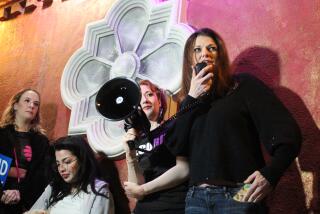Cirque de Soleil Settles With Gymnast Fired Over HIV
- Share via
SAN FRANCISCO — Cirque du Soleil has agreed to pay $600,000 to a gymnast who was fired by the Canadian circus because of his HIV status, under a settlement announced Thursday by the U.S. Equal Employment Opportunity Commission.
In an unusual move, the circus known worldwide for its surreal beauty and aerial acrobatics agreed to waive confidentiality and publicize the settlement, the maximum allowed for a violation of the Americans With Disabilities Act. Circus officials had openly admitted terminating Matthew Cusick’s contract because he was HIV-positive, even though he was healthy and had been cleared to perform by circus doctors.
“It’s a victory -- for not only me but everybody who is HIV-positive, to know that they have rights and that people will help them stand up ... to fight these injustices,” said Cusick, 32, who was days away from a stint on the Russian high bar in the Las Vegas performance of “Mystere” when he was fired last April.
“I believe the message that it sends to employers is, if you are going to discriminate against somebody, there is a price to pay,” he said.
Cirque du Soleil’s top brass told Cusick that his role as an acrobatic catcher could subject fellow athletes -- and even the audience -- to risk, a contention they repeated for months while defending their decision.
But after extensive talks with San Francisco’s Human Rights Commission -- which filed its own discrimination claim against the circus while it performed here -- and a nationwide outcry by AIDS activists, physicians and athletes, circus officials conceded that they had misunderstood the medical risks.
Activists around the country supported Cusick, saying that the circus was decades behind in its understanding of the medical realities of HIV.
Under the settlement announced Thursday, Cusick will receive $300,000 in compensatory damages, $60,000 in back pay for a year of lost wages and $200,000 in future wages, since he declined circus offers to rehire him. He also received $40,000 in attorneys fees.
In addition, the settlement mandates that the circus appoint an equal employment opportunity officer to train employees annually, with an emphasis on HIV discrimination, and that its records remain open to the Equal Employment Opportunity Commission for two years.
Cusick’s complaint to the commission was a necessary precursor to litigation. Olophius Perry, director of the commission’s Los Angeles district office -- which includes Nevada -- commended circus officials for working constructively with the agency.
Even before the process concluded, the circus was taking steps to correct its error. The circus revised its nondiscrimination policy -- with the help of the San Francisco commission, which has dropped its complaint -- to protect HIV-positive employees.
More than a month ago, the circus also hired Dr. Rejean Thomas, who has been traveling to the circus’ sites worldwide to educate its 2,700 employees, said circus spokeswoman Renee-Claude Menard.
“It was a very long episode, and at the same time an educating episode for us,” she said. “We’ve put in place a lot of elements to a make sure we keep learning about HIV and also blood-borne pathogens.”
Menard said the circus “would have enjoyed much more to welcome Matthew back, since we went through this whole process of better understanding what this was all about.”
Hayley Gorenberg, an attorney for the gay civil rights group Lambda Legal -- which represents Cusick -- agreed that the settlement would reverberate far beyond Cusick.
“There are more people who can live longer with HIV and they’re doing a lot of different kinds of jobs,” Gorenberg said.
“They deserve to keep those jobs just like anyone else. This means their employers need to operate on fact, not on fear.”
More to Read
Sign up for Essential California
The most important California stories and recommendations in your inbox every morning.
You may occasionally receive promotional content from the Los Angeles Times.














